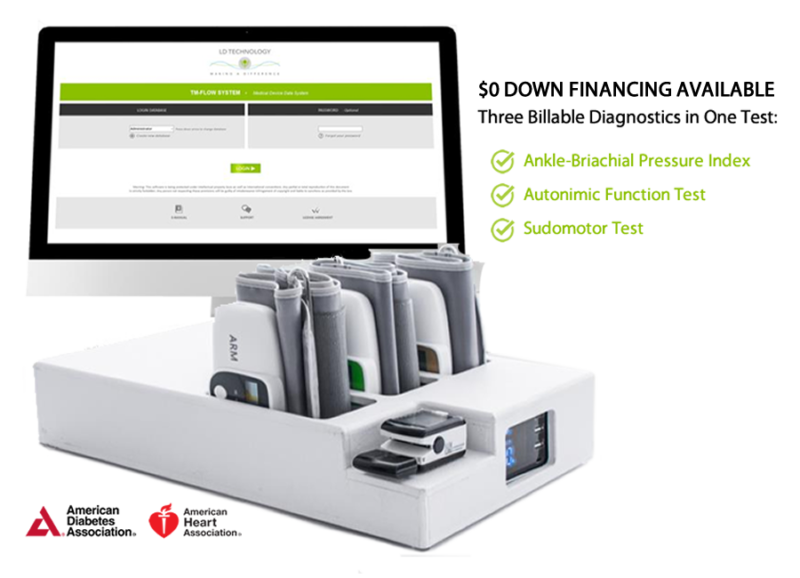Frequently Asked Questions
The TM Flow device offers numerous benefits for medical practices, including non-invasive and accurate testing, early detection of autonomic and arterial dysfunctions, and comprehensive diagnostics that reduce the overall cost of patient care. Additionally, the device’s tests are easy to bill with multi-code diagnostics, making it a valuable investment for enhancing patient care and optimizing practice efficiency. It also supports compliance with standards of care recommended by leading health organizations.
Yes, the TM Flow device is covered by Medicare and most private pay carriers. Specific CPT codes, such as 95921 for cardiovagal innervation and 93923 for ankle-brachial pressure index, ensure that the diagnostics are easy to bill. Coverage and reimbursements may vary depending on the Medicare locality, but the comprehensive diagnostics offered by the TM Flow device are widely recognized and supported by insurance providers.
Autonomic nervous system testing is crucial for diabetes and cardiovascular patients because it helps in the early detection of autonomic neuropathy, which is a common complication in these conditions. Early detection through ANS testing allows for timely intervention and management, reducing the risk of further complications. The American Diabetes Association recommends ANS testing as a standard of care for patients with Type 1 and Type 2 diabetes, highlighting its importance in effective diabetes management.
The TM Flow device is an advanced, non-invasive diagnostic tool designed to perform a series of tests that aid in the identification and early detection of autonomic nervous system (ANS) and arterial dysfunctions. It provides quantitative assessments of the ANS, helping to distinguish between early and late stages of autonomic neuropathy. The TM Flow device is particularly valuable for cardiovascular and diabetic autonomic neuropathy (DAN) testing, making it an essential tool in diabetes management and cardiovascular assessments.
The Business of ANS Testing
Autonomic Nervous System (ANS) testing is a useful tool both clinically & financially when used appropriately in a medical facility.
“Although there is a wide variety of use for ANS testing, medical facilities must adhere to the guidelines of use from Medicare & private insurance. Please be aware that regional guidelines vary so we advise that you consult your Local Coverage Determination from Medicare and be aware of the guidelines put forth by each insurance company.”
Here is a video on how to look up the reimbursements based on a provider’s CMS locality:
Generally speaking reimbursements run around $350 per test and have increased steadily over the past few years.
Proving it to a practice:
Most primary care practices see at least 20 patients per day, most of whom would qualify for this diagnostic test. Based on an average acquisition cost of $37,500, plus the typical consumable cost of $3.10 per test, testing two patients/day (5 days a week), a typical client should expect:
Gross Income: $14,058.45
Operating Expense Incl Lease & Consumables $ 961.54
Net Monthly Profit $ 13,006.91
Annual Net Profit $ 157,162.95
2.8 Tests Per month to break even on Capital Lease
2.9 Months to Full Recovery on Investment
Annual ROI: 419%
Typical Mutual Funds 10%
It’s better to invest in yourself and your clinic!
Additional practice benefits of ANS testing:
Convenient Technology Implementation
Reimbursable by Government & Private Payers
Turn Key Solution
$0 Out of Pocket Investment
Clinically Relevant
Promotes Highest Quality Care
Proven Best Practice to Lower Overall Cost of Care
Increases MACRA & MIPS scores
RSS FEED
- The TM Flow is a highly reimbursable diagnostic in Portland, OR
- Pain Clinics in Albuquerque, NM Adopt the TM Flow as Gold Standard
- Neuropathy in Philadelphia, PA can be detected with the TM Flow device
- Pain Management Clinics in Dallas, TX are Using the TM Flow to Diagnose Symptoms
- Unlocking the Potential of ANS Testing: Insights for Healthcare Providers
- Neuropathy clinics in Savanah, GA use the TM Flow
- Come to Charleston, WV to Get a TM Flow
- How the TM Flow will maximize your physician practice in Boise Idaho
- Doctors in Pittsburg, PA are using the TM Flow for the treatment of neuropathy
- Which Patients Require ANS Testing?
